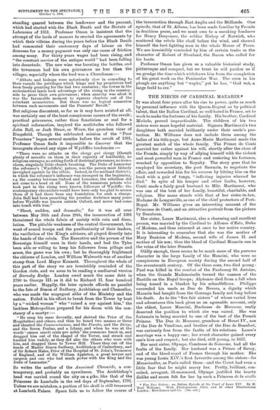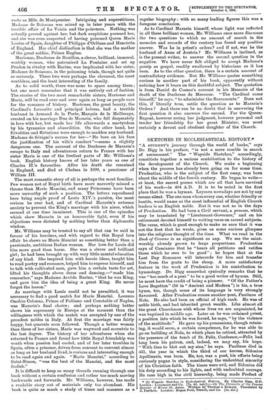THE NIECES OF CARDINAL MAZARIN.*
IT was about four years after his rise to power, quite as much by personal influence with the Queen-Regent as by political talent, that the Italian Cardinal, so well hated in France, set to work to make the fortunes of his family. His brother, Cardinal Micliele, proved impracticable. The children of his two sisters were more hopeful material. Signora Martinozzi's two daughters both married brilliantly under their uncle's pro- tection. Mr. Williams does not include them among the ladies of his title-page, but Anne-Marie Martinozzi made the greatest match of the whole family. The Prince de Conti married her rather against his will, shortly after the close of the Fronde, simply by way of allying himself with the richest and most powerful man in France and restoring his fortunes, wrecked by opposition to Royalty. The story goes that he employed his secretary, the poet Sarrazin, to negotiate the affair, and rewarded him for his success by bitting him on the bead with a pair of tongs, "inflicting injuries whereof he died." In spite of his temper and other faults, however, Conti made a fairly good husband to Mlle. Martinozzi, who was one of the best of her family, beautiful, charitable, and religious. Her name stands with that of her sister-in-law, Madame de Longueville, as one of the chief protectors of Port- Royal. Mr. Williams gives an interesting account of the Princesse de Conti, and an attractive portrait from the picture by Beaubrun.
Her sister, Laure Martinozzi, also a charming and excellent person, was married by the Cardinal to Alfonso d'Este, Duke of Modena, and thus returned at once to her native country. It is interesting to remember that she was the mother of Mary Beatrice of Modena, second wife of James II. and mother of his son; thus the blood of Cardinal Mazarin ran in the veins of the later Stuarts.
Oddly enough, there seems to be much more of the parvenu character in the large family of the Mancini, who were so conspicuous in European society during the second half of the seventeenth century. Of the three sons, two died young : Paul was killed in the combat of the Faubourg St. Antoine, when the Grande Mademoiselle turned the cannon of the Bastille on the Royal troops; Alphonse died from a fall when being tossed in a blanket by his schoolfellows. Philippe succeeded his uncle as Due de Nevers, a dignity which Mazarin had bought from the Gonzaga family not long before his death. As to the "five fair sisters" of whose varied lives and adventures this book gives us an agreeable account, only the eldest, Laure Mancini, Duchess° de Mercceur, really deserved the position to which she was raised. She was fortunate in being married to one of the best of the French Princes. The Duo de Mercceur, grandson of Henri IV., son of the Due de Vendome, and brother of the Due de Beaufort, was curiously free from the faults of his relations. Laure's marriage was a happy one ; her sweet character gained every one's love and respect ; but she died, still young, in 1657.
Her next sister, Olympe, Comtesse de Soissons, had all the faults of the family. Her husband was a Prince of Savoy, and of the blood-royal of France through his mother. She was young Louis X1V.'s first favourite among the sisters—leg Mazarinettes, as Paris called them—and the Court had even a little fear that be might marry her. Pretty, brilliant, con- ceited, arrogant, ill-mannered, Olympe justified the hearty dislike and scorn felt for her by such a Princess de la vieille
* Five Fair Staters: an Italian Episode at the Court of Louis XIV. By /I. Noel Williams. With Photogravure Plate and 16 other Illustrations. London Hutchinson and Co. Il6s. net.] roche as Mlle. de Montpensier. Intriguing and superstitious, Madame de Soissons was mixed up in later years with the
terrible affair of La Voisin and the poisoners. Nothing was actually proved against her, but dark suspicions pursued her, and she was even suspected of having poisoned Queen Marie Louise of Spain, daughter of Philippe d'Orleans and Henrietta of England. Her chief distinction is that she was the mother of the great soldier, Prince Eugene.
Marianne, Duchesse de Bouillon, a clever, brilliant, immoral, worldly woman, who patronised La Fontaine and set up Pradon in rivalry with Racine, was implicated with her sister, Madame de Soissons, in the poisoning trials, though not quite so seriously. These two were perhaps the cleverest, the most worthless, and the least interesting of the family.
As to solid worth, there was none to spare among them; but one must remember that it was entirely out of fashion. The stories of the two most remarkable sisters, Hortense and Marie, will be read over and over again as long as people care for the romance of history. Hortense, the great beauty, the Cardinal's favourite and principal heiress, had a terrible husband in Armand de la Porte, Marquis de la Meilleraye, created on his marriage Due de Mazarin, who fell desperately in love with her, but made her life afterwards a martyrdom by his tyrannies and absurdities. On the other band, her frivolities and flirtations were enough to madden any husband. Madame de Sevigne's excuse for her—" He bore on his face the justification of his wife's conduct "—seems a slightly dangerous one. The account of the Duchesse de Mazarin's escape to Italy and adventurous return to France with her sister Marie is one of the liveliest parts of Mr. Williams's book. English history knows of her later years as one of Charles II.'s favourites. After his death she remained in England, and died at Chelsea in 1699, a pensioner of William III.
The most romantic story of all is perhaps the most familiar. Few women not of Royal birth have more narrowly missed a throne than Marie Mancini, and many Princesses have been more unworthy of such a position. The letters reproduced here bring ample proof of Louis XIV.'s passion, the most serious he ever had, and of Cardinal Mazarin's extreme anxiety to prevent the King's marriage with his niece, which seemed at one time imminent. This is one of the episodes which show Mazarin in an honourable light, even if his objections were dictated by nothing better than diplomatic wisdom.
Mr. Williams may be trusted to say all that can be said in favour of his heroines, and with regard to this Royal love affair he shows us Marie Mancini as something better than a passionate, ambitious Italian woman. Her love for Louis did him more good than harm. She was a clever and brilliant girl; he had been brought up with very little mental education of any kind. She inspired him with heroic ideas, taught him to read poetry and romance, helped him to express himself, and to talk with cultivated men, gave him a certain taste for art, lifted his thoughts above dress and dancing,—" made him remember," says Madame Arvede Barine, "that he was King, and gave him the idea of being a great King. He never forgot the lesson."
As marriage with Louis could not be permitted, it was necessary to find a good match for Marie Mancini. Lorenzo Onofrio Colonna, Prince of Palliano and Constable of Naples, was Mazarin's final choice ; and perhaps nothing better shows his supremacy in Europe at the moment than the willingness with which the match was accepted by one of the proudest nobles in Italy. At first the marriage was fairly happy, but quarrels soon followed. Though a better woman than three of her sisters, Marie was wayward and eccentric to the last degree. The history of her adventures when she returned to France and found how little Royal friendship was worth when passion had cooled, and of her later troubles in Spain, often a prisoner, driven from convent to convent almost as long as her husband lived, is curious and interesting enough to be read again and again. "Marie Mancini," according to Saint-Simon, "was the best of the Mancini, and the most foolish."
It is difficult to keep so many threads running through one book without a certain confusion and rather too much moving backwards and forwards. Mr. Williams, however, has made a readable story out of materials only too abundant. His book is quite as muoh a study of times and manners as a regular biography : with so many leading figures this was a foregone conclusion.
As to Cardinal Mazarin himself, wl3o8e light was reflected in all these brilliant women, Mr. Williams once more discusses the two questions to which no amount of search in the memoirs and records of the century has found any positive answer. Was he in priest's orders? and if not, was he the husband of Anne of Austria ? Mr. Williams is inclined, as is the present writer, to answer the second question in the negative. We have never felt obliged to accept Madame's gossip as gospel, readily swallowed by historians as it has been. As to the other question, there is a certain amount of contradictory evidence. But Mr. Williams quotes something curious in another part of his book, apparently without noticing how it bears on this doubtful subject. The quotation is from Daniel de Cosnac's account in his Memoirs of the death of the Duchesse de Mercceur. "The Cardinal came himself," he says, "to administer the Sacraments." Does not this, if literally true, settle the question as to Mazarin's Orders ? And there can be no doubt that in answering the first question it also answers the second. For the Queen. Regent, however erring her judgment, however personal and tender her friendship for her great Minister, was most certainly a devout and obedient daughter of the Church.































































 Previous page
Previous page